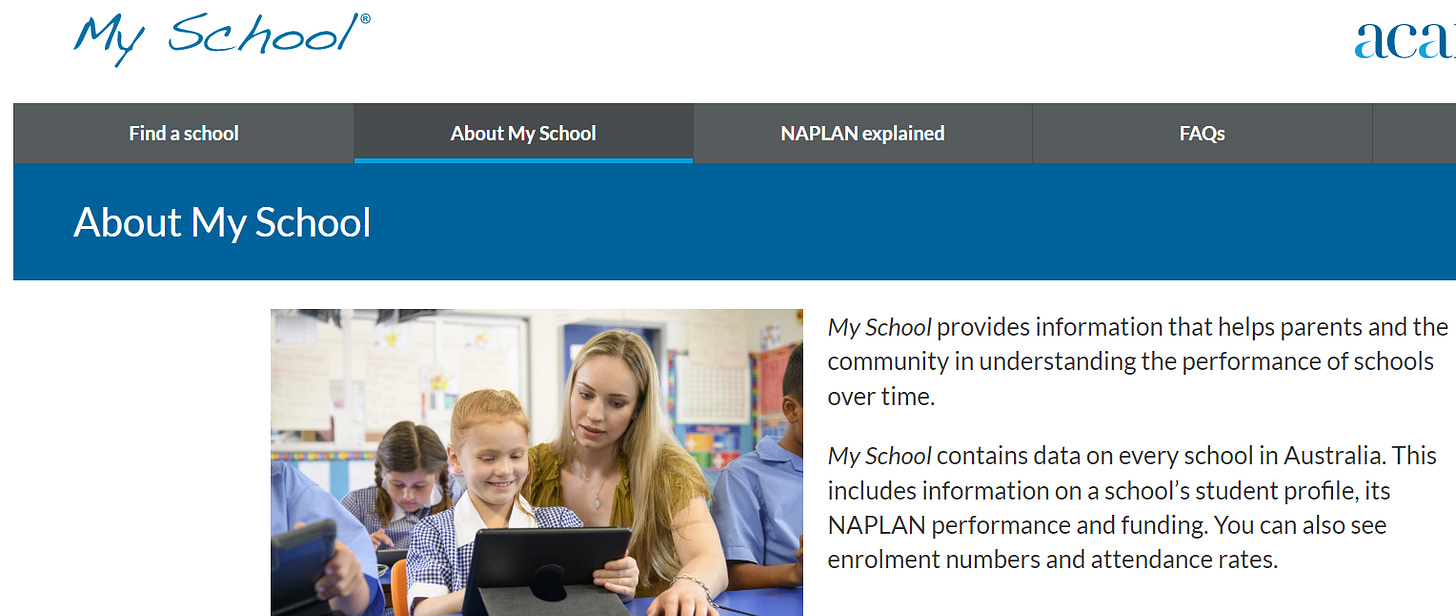
I will firstly come out and say it. I do use Myschool from time to time. I appreciate some of the demographical data that is available, but I do find the whole premise of the tool uncomfortable.
The reason I find it uncomfortable is that for me (and many others), Myschool is a clear example of how neoliberalism has come to frame to what education ought to look like here in Australia. That is, that schooling should become part of a broader educational marketplace, where parents (as consumers) may compare the performance of schools to decide where to enroll their children.
If you have read anything within critical fields of education, you will most likely have come across the critique of neoliberalism and it’s impact on education. I have in my writings often defined neoliberalism as an ideology, characteristed by values of marketisation, consumerism and deregulation that aims to create markets within educational spaces (MacDonald-Vemic & Portelli, 2020; Wilkins, 2012).
However, I have been reading up lately on some recent work in the education field, which has highlighted a number of problems with the way that academics approach the critique of neoliberalism.
To name some of the issues, neoliberalism is argued to be too be too encompassing a concept (Rowlands & Rawolle, 2013), often left undefined in literature (Rowe et al., 2019) and commonly disregards contradictory implementations of neoliberalisation in the South (Ong, 2007). Furthermore, neoliberalism as a concept seems hard to pin down. It seems to morph and shift, almost molding other values (such as humanistic tenets) in its image (Bamberger et al., 2019). Some academics challenge the use of neoliberalism in how it seems to have become a “catch all” phrase for anything negative (Rowlands & Rawolle, 2013). There is a sense that because of all this, critique of neoliberalism is becoming quite tiresome (Means & Slater, 2019).
But putting these issues aside, neoliberalism (however it is ultimately defined) still has real effects that impact real people and continues to contribute to the ways in which politicians, teachers and the public understand the purpose and aims of education to be.
Let’s return to our example of neoliberalism in the creation of MySchool.
In my perspective MySchool has the potential to redefine schooling as an individualised route to personal prosperity, which seeks to create “winners” and “losers” in Australian education. This is concerning in and of itself. But more concerning is that it can have has strong implications for how schooling communities and teachers consider themselves in relation to one another. As teachers, rather than engaging together in the complexity of what it means to educate people, we may find ourselves shrinking inwards, compromising on our values and restricting our practice as a means of self-preservation to avoid undesirable labels.
When this becomes reality, if we are playing a game of winners and losers as MySchool seems to tell us (though I sincerely hope we are not), I think it’s safe to say that everyone loses.
So no, I don’t think we need to “get over” neoliberal critique.
Let’s keep the dialogue going.
Till next time,
References
Bamberger, A., Morris, P., & Yemini, M. (2019). Neoliberalism, internationalisation and higher education: connections, contradictions and alternatives [Article]. Discourse: Studies in the Cultural Politics of Education, 40(2), 203-216. https://doi.org/10.1080/01596306.2019.1569879
Means, A. J., & Slater, G. B. (2019). The dark mirror of capital: on post-neoliberal formations and the future of education [Article]. Discourse: Studies in the Cultural Politics of Education, 40(2), 162-175. https://doi.org/10.1080/01596306.2019.1569876
MacDonald-Vemic, A., & Portelli, J. (2020). Performance power: the impact of neoliberalism on social justice educators' ways of speaking about their educational practice [Article]. Critical Studies in Education, 61(3), 296-312. https://doi.org/10.1080/17508487.2018.1428642
Ong, A. (2007). Neoliberalism as a Mobile Technology [research-article]. Transactions of the Institute of British Geographers, 32(1), 3-8. https://ezproxy.deakin.edu.au/login?url=https://search.ebscohost.com/login.aspx?direct=true&db=edsjsr&AN=edsjsr.4639996&site=eds-live&scope=site
Rowe, E., Lubienski, C., Skourdoumbis, A., Gerrard, J., & Hursh, D. (2019). Templates, typologies and typifications: neoliberalism as keyword [Article]. Discourse: Studies in the Cultural Politics of Education, 40(2), 150-161. https://doi.org/10.1080/01596306.2019.1569875
Rowlands, J., & Rawolle, S. (2013). Neoliberalism is not a theory of everything: a Bourdieuian analysis of illusio in educational research. Critical Studies in Education, 54(3), 260-272. https://doi.org/10.1080/17508487.2013.830631
Wilkins, A. (2012). The spectre of neoliberalism: pedagogy, gender and the construction of learner identities. Critical Studies in Education, 53(2), 197-210. doi:10.1080/17508487.2012.672332




